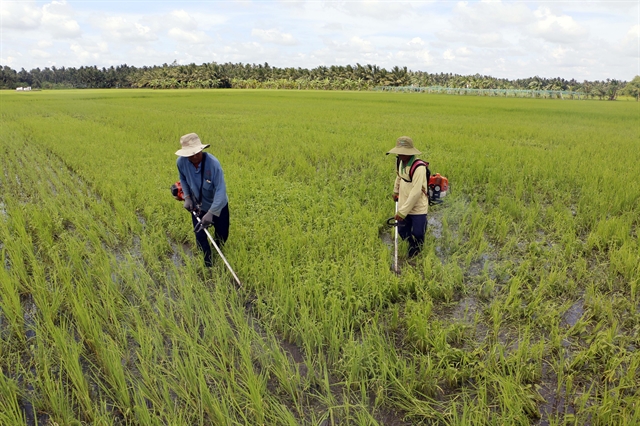 Society
Society


|
| Members of the Tấn Đạt Agriculture and Service Co-operative tend an organic rice field in Vĩnh Long Province’s Vũng Liêm District. — VNA/VNS Photo Phạm Minh Tuấn |
VĨNH LONG — More co-operatives in the Cửu Long (Mekong) Delta province of Vĩnh Long are working with companies and establishing value chains for their products, increasing profits for members.
The co-operatives, which are buying input materials at cheaper prices, are guaranteed outlets at better prices for their members.
As of the end of last year, the province had a total of 158 co-operatives. Nearly half are agricultural co-operatives.
Nguyễn Thành Một, deputy director of the province’s Department of Agriculture and Rural Development, said 23 of the province’s 77 agricultural co-operatives are working with companies and setting up value chains for their products.
The Tấn Đạt Agriculture and Service Co-operative in Vũng Liêm District’s Trung Ngãi Commune has 15 members and a total farmland of 11.5ha. It produces rice seeds for cultivation, high-quality paddy and organic paddy.
It also provides services for transplanting rice seedlings by machine.
Đặng Văn Tài, director of the co-operative, said the co-operative works with companies from production through sale stages to increase product value and members' incomes.
As a result, members can buy input materials at prices 10-20 per cent lower than the market price, and their products sell for VNĐ100-200 a kilo more than the market price, he said.
The profit of the co-operative’s members is 1.5 times higher compared to their previous profits, he said.
The co-operative was set up in 2017.
The income of the province’s co-operative members was VNĐ5.5 million (US$235) per month each, as of the end of last year, up 253 per cent against 2003, according to the province’s Department of Planning and Investment (DPI).
However, most of the province’s co-operatives have low capital, and efficiency and sustainability are not high, said the DPI.
Most co-operative management boards have limited management capacity, it added.
Dương Văn Cảnh, vice chairman of the province’s Co-operative Alliance, said the province should create favourable conditions for co-operatives to access soft loans from commercial banks.
The province should also develop policies to train human resources and update production technologies, he said, adding that support policies on developing infrastructure for co-operatives should also be created.
Trần Hoàng Tựu, vice chairman of the province’s People’s Committee, said the People’s Committee had asked agencies and localities to focus on developing better coordination between companies and co-operatives in production and consumption.
Besides help from the State, including production models, the co-operatives need to independently work to expand production and their markets, he said.
The province has set up a co-operative support fund with registered capital of VNĐ7 billion ($300,000) to provide soft loans for the co-operatives.
The province targets having 250 co-operatives by 2025 with an annual growth rate of more than 12 per cent. — VNS




